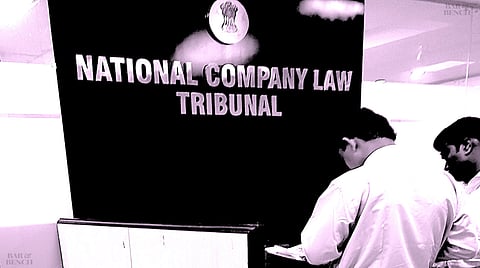
- News
- Columns
- Interviews
- Law Firms
- Apprentice Lawyer
- Legal Jobs
- हिंदी
- ಕನ್ನಡ

The National Company Law Tribunal (NCLT) has held that the Tribunal can order/allow the Resolution Professional to take possession of such assets of Corporate Debtor/Corporate Applicant which are the subject matter of any litigation in order to facilitate the Corporate Insolvency Resolution Process CIRP).
The NCLT has based its judgment on the finding that a conjoint reading of Sections 60(5), 63, 231 and 238 excludes the jurisdiction of a Civil Court in matters related to the Insolvency & Bankruptcy Code, 2016.
The Judgment has been passed by Member (Judicial) Suchitra Kanuparthi pursuant to a reference made by a two-member bench of Member (Judicial) Bhaskara Pantula Mohan and Member (Technical) V Nallesenapathy in a case concerning insolvency proceedings pursuant to an application under Section 10 of the Insolvency and Bankruptcy Code, 2016.
After Section 10 application by the Corporate Applicant was admitted by NCLT, Suresh Taluja was appointed as the interim resolution professional (IRP). During the CIRP, the IRP found that one Pravin Blaggan (applicant) was “illegally” occupying a shed owned by the Corporate Applicant.
The IRP thus wrote to the applicant, directing him to hand over the possession of this shed within 24 hours. In response, the applicant sought the intervention of the Tribunal.
The applicant pointed out that the issue of possession/occupation of the shed was sub judice before a Civil Court and therefore, the IRP should be directed to refrain from acting in furtherance of his direction.
The IRP, on the other hand, argued that it was his duty to take control and custody of any asset owned by the Corporate Debtor including the assets which are not in its possession. It was further argued that the pendency of a civil suit would not prejudice the right of the IRP under IBC.
After hearing the parties, the two members on the Bench took divergent views on whether IRP was allowed to take possession of the shed and the matter was referred to a third member.
The third member heard the parties at length and remarked,
“The Core issue is whether NCLT can order possession of the property of Corporate Applicant to facilitate the CIRP process and allow the Resolution Professional to take possession of the assets of Corporate Applicant, pending adjudication of a pending suit filed by Corporate Applicant seeking possession of the shed from the applicant..”
To arrive at a conclusion, the NCLT perused several judgments passed by the Delhi High Court and the Supreme Court of India.
It observed that that in Liberty House Group Pte Ltd. Vs. State Bank of India and Ors, the High Court had clearly stated that no Civil Court shall have the jurisdiction to entertain any suit or proceedings in respect of any matter on which the NCLT had jurisdiction under IBC. It further recorded that the Supreme Court in ArcelorMittal India Pvt. Ltd. Vs. Satish Kumar Gupta had held that no other forum had the jurisdiction to entertain proceedings by or against a Corporate Applicant covered by IBC and a practice to the contrary would introduce manipulations to frustrate the resolution process.
In line with the above orders, the third member iterated that IBC was self-contained legislation which conferred the supervisory powers over CIRP process on NCLT, right from the stage of an application being made for the initiation of the CIRP process to the completion of the CIRP/ Liquidation as the case may be.
And, therefore, Section 60(5)(b),(c) IBC empowered the NCLT to entertain disputes raised in a suit and Section 63 IBC barred the jurisdiction of the Civil Court.
It also noted that Section 231 IBC barred the jurisdiction of a civil court with regard to the grant of any injunction in respect of any action taken or in pursuance of any order passed by the NCLT under IBC and the non-obstante clause in Section 238 IBC clarified that IBC shall have effect notwithstanding anything inconsistent contained in any other law.
“The principles of comity would be affected if conflicting order were passed by the Civil Court and the NCLT the same would be detrimental to the resolution process. The office of Resolution Professional has become functus officio, the Liquidator has been appointed, the liquidator subject to the directions of the Adjudicating Authority under section 35(1)(b) has the power to take into his custody or control all the assets, property effects an actionable claim of the Corporate Applicant.”, the third member stated.
In conclusion, it was recorded,
“Upon conjoint reading of section 60(5), section 63, section 231 and section 238, the jurisdiction of Civil Court is excluded related to the matters related to I & B code. Therefore, it can be held that NCLT can order possession of the property of Corporate Applicant to facilitate the CIRP process and allow the Resolution Professional to take possession of the assets of Corporate Applicant.”
In the present case, the CIRP process was over and the IRP had been appointed as the liquidator. Therefore, in view of the overriding powers under section 238 of the Code and Rule 11 of NCLT Rules 2016, the NCLT directed that Resolution Professional/Liquidator be allowed to take possession of the shed from the Applicant.
The Applicant was represented by Advocate Jai Chhabria with Advocates Arnav Misra and K Ashar & Co.
The Resolution Professional was represented by Advocate Rahul Dev and Argus Partners.
Read the Judgement: